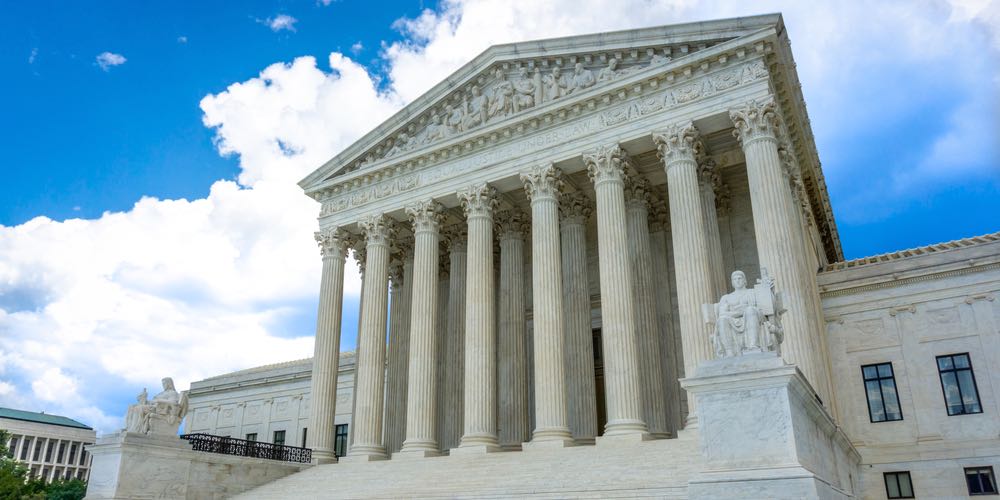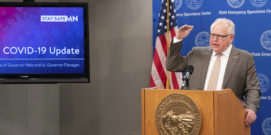Does the text of the Free Exercise Clause justify special judicial scrutiny of laws burdening religious freedom?
A Win for All Americans
The Supreme Court has released its long-awaited decision in 303 Creative LLC v. Elenis as part of its conclusion to the 2022 term. The case represents a victory for all who support the First Amendment in protecting expression and debate against the censorship of ideas deemed offensive by majorities or government officials. The case also delineates the limits, for the time being, of how far commercial activity can be coerced by a state under public accommodation laws.
303 Creative is the vehicle through which a Christian website designer, Lorie Smith, intends to offer her artistic services to celebrate marriages. All agreed that Lorie Smith is willing to offer her services to the public, without regard to sexual orientation. However, she refuses to communicate messages that contradict “biblical truths.” For this reason, she will not produce artistic content celebrating same-sex marriages.
Before entering this market, she sought assurance that she will not be penalized under the Colorado Anti-Discrimination Act [CADA] because she will not create messages celebrating same-sex unions. CADA includes a broadly worded “public accommodation” law. Such statutory laws forbid producers from denying the “full and equal enjoyment” of goods and services to certain protected classes. In Colorado, sexual orientation is among the protected classes that cannot be denied goods and services.
Lorie Smith argued that she should be entitled to an exemption from CADA’s public accommodation law under the First Amendment. She contended that, given the nature of her business, the law would effectively coerce her to produce messages that she objects to as a Christian. She would be forced to speak in a manner that violates her conscience.
She lost her case at the District Court level and in the Tenth Circuit Court. The Tenth Circuit recognized her services to be “pure speech.” But its majority reasoned that public accommodation laws further the compelling interest of ensuring equal access to goods and services for this protected class. Moreover, it asserted that no option short of coercing her speech could ensure the equal treatment of the LGBT community in benefiting from her “unique” services.
Justice Gorsuch, writing for a majority of six, explained that the Tenth Circuit went far afield from well-settled precedent in failing to recognize the paramount importance of the First Amendment issues at stake in this case. Gorsuch noted that the First Amendment has long protected persons from being compelled to communicate government-sanctioned messages. He cited as authority for this proposition the case of West Virginia v. Barnette, where it was decided that the First Amendment protects school children, such as Jehovah’s Witnesses, from being coerced to salute the American flag and cite the Pledge of Allegiance.
He also noted that First Amendment protection extends to public accommodations in cases involving expressive conduct that is “pure speech” as well as to expressive associations. For instance, Hurley v. Irish-American Gay, Lesbian and Bisexual Group of Boston involved a parade that was characterized as a “public accommodation” as that expansive term has come to be understood. Yet the First Amendment allowed parade organizers to exclude messages that its sponsors did not wish to communicate because a parade is expressive conduct. Further, in Boy Scouts of America v. Dale, the Court recognized that, although the Boy Scouts can also be characterized as a public accommodation, the First Amendment protects the Boy Scouts’ right to control its members, even if that means excluding an openly gay assistant scout master. In this case, the First Amendment protects expressive associations like the Boy Scouts.
In applying these precedents to the facts in 303 Creative, Justice Gorsuch reasoned that, as in Barnette and Hurley, Lorie Smith would face this untenable choice: “If she wishes to speak, she must either speak as the State demands or face sanctions for expressing her own beliefs, sanctions that may include compulsory participation in ‘remedial . . . training,’ filing periodic compliance reports as officials deem necessary, and paying monetary fines.” The First Amendment forbids the government from forcing persons to make such a choice. Those controlling public accommodations may take a position, even an unpopular position, about important public issues without reprisals from the government when their commercial activity constitutes pure speech.
The dissent, authored by Justice Sotomayor, and joined by Justices Kagan and Jackson, tried to distinguish these precedents. They contended that none of these cases involved commercial activities. Instead, they involved school children and nonprofits.
But, as Justice Gorsuch properly countered, there is no First Amendment exception for commercial entities when they speak, or choose not to speak, about matters of public concern. As Gorsuch observed, most works of literature and other art forms are for profit, but they do not lose First Amendment protection for that reason. Moreover, even service providers who speak with lesser artistic flair deserve protection. Gorsuch rebuked the dissent thus: “A commitment to speech for only some messages and some persons is no commitment at all.”
More to the point, the dissent refused to recognize that public accommodation laws might sometimes coerce speech. They reasoned that such laws regulate conduct; they only incidentally affect speech. These laws target acts of discrimination by commercial providers. Yet businesses remain free to take positions in other contexts.
According to this logic, commercial entities per se forfeit First Amendment protection in market exchanges. Justice Gorsuch’s reasonable rejoinder was that, in some cases, commercial actions can be inherently expressive. In some exceptional instances, compelling commercial activity is equivalent to compelling speech. Such is the case in 303 Creative.
While virtually all can agree that historically marginalized populations are deserving of equal protection and respect, it is less clear why they ought to receive protection only in their capacity as consumers. Why should protected classes, in their capacity as producers, also not be entitled to “equal dignity?”
The dissent’s passion cannot be fully appreciated without understanding the moral imperatives read into public accommodation laws. In Justice Sotomayor’s view, such laws strive to preserve not simply “equal access” to goods and services; they also advance “equal dignity.” The denial of goods or services does not simply result in commercial deprivation; it also inflicts emotional harm. As Justice Sotomayor properly notes: “Lesbian, gay, bisexual, and transgender (LGBT) people, no less than anyone else, deserve that dignity and freedom.”
This is true. Yet the quest to ensure “equal dignity” through public accommodation laws is fraught with hazards. Understood concretely, the objective of public accommodation laws, so conceived, is to avoid hurt feelings on the part of consumers within certain protected classes. While virtually all can agree that historically marginalized populations are deserving of equal protection and respect, it is less clear why they ought to receive protection only in their capacity as consumers. Why should protected classes, in their capacity as producers, also not be entitled to “equal dignity?”
To make this problem worse, Sotomayor views “the true power” of a public accommodation law to lie “in its capacity to evolve, as society comes to understand more forms of unjust discrimination and, hence, to include more persons as full and equal members.” The expansion of protected classes benefiting from public accommodation laws risks degenerating into a competition for public favoritism among marginalized groups, whose interests, identities, and emotions may be at odds. The First Amendment, quite properly, ranks the protection of interests, identities, and emotions below the protection of conscience, speech, and debate.
In truth, those who characterize 303 Creative as a defeat for LGBT rights are quite wrong. The case is a victory for the freedom of speech that Christians, the LGBT community, and all Americans enjoy. All in America, whether they be religious believers or not, whether they identify as LGBT or not, can use their powers of speech in the marketplace of ideas, as well as in the marketplace of goods and services. They may work with entities in the commercial realm that advocate messages they support. And, because of 303 Creative, they may also control their expressive conduct and expressive associations in the commercial exchanges by refusing to communicate messages they do not support. Furthermore, no group may use the power of the government, when they happen to be in the majority, to silence messages on serious social issues they deem to be offensive.
Finally, the dissent raised some troubling hypotheticals. Among those described are the following scenarios: If a business offers passport photos, may it deny those services to Mexican Americans because the owner opposes immigration from Mexico? If a photographer believes a woman’s place is in the home, may they refuse to offer corporate headshots to women?
Justice Gorsuch refused to engage in speculation, noting that these scenarios weren’t before the Court. Yet surely our powers of discernment are sharp enough to understand that a passport photographer does not engage in their own speech in taking pictures that must meet government specifications. Nor is it likely that a photographer who takes corporate headshots is speaking in their own voice.
303 Creative may be maligned in the short term by those who wished for another outcome for their favored protected class. But those who denigrate it today may find that they will benefit from it tomorrow. The case limits the potential for majority tyranny within localities where protected classes are politically dominant. It levels the playing field for expression, no matter which side of a commercial transaction one may be on. And it favors the protection of speech and debate over feelings. The case is a win for all who treasure the First Amendment.



